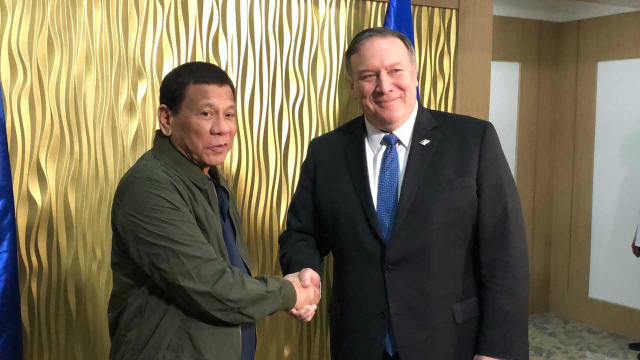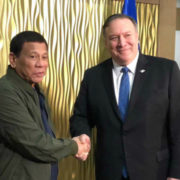
A United States State Department official said there has yet to be a request to renegotiate the Mutual Defense Treaty (MDT) between the U.S. and the Philippines.
This comes despite recent calls for amending the 1951 treaty.
Patrick Murphy, State Department Principal Assistant Secretary for Southeast Asia, told reporters that “there is no request from either side to renegotiate the treaty.”
He added, “That said, we have frequent discussions and talks in appropriate channels with appropriate mechanisms on a regular basis about the treaty.”
Earlier this week on Wednesday, March 20, Philippine Department of National Defense (DND) Secretary Delfin Lorenzana said that he would hold exploratory discussions on the mutual defense treaty (MDT) with a senior defense official from the United States.
Lorenzana met U.S. Deputy Assistant Secretary of Defense for South and Southeast Asia Joseph Felter on Thursday, March 21, to “open discussions on what is in the Philippine-U.S. MDT.”
The Philippines’ defense secretary clarified that it was a mere proposal to discuss the content of the 1951 agreement between the two countries. He explained that they have yet to draft a line-up of what the discussion would be about.
“It is only exploratory talks, there is still no talking points there. We only wanted to know what they think about our proposal to open up for discussion what is in the Mutual Defense Treaty,” Lorenzana said as reported by The Philippine Star.
A U.S. vessel commanding officer stated the importance of the 68-year-old agreement among the military forces of both countries as he noted that “sharing contributes to regional security and stability, reinforces our partnership and enhances interoperability.”
During the U.S. Navy warship port call in Manila, USS Chief Lieutenant Commander Frederick Crayton emphasized that they are indeed duty-bound to aid the Philippines in defense and protection as provided by the MDT.
“We are excited to make the most of this port visit in the hope of fostering a closer and stronger relationship with the Philippines and interact with the Filipino people we are sworn to defend through our Mutual Defense Treaty,” Crayton said as reported by The Philippine Daily Inquirer.
Crayton, who is deemed in charge of the Avenger-class mine countermeasures ship of the US Navy’s 7th Fleet, said that he and his crew were set to conduct joint activities with the Philippine Navy (PN). The USS Chief has now moored the Manila South Harbor.
The ship commander also expressed his sadness after visiting the American Cemetery in Taguig City. He commemorated the lives of the 16,000 U.S. servicemen and 600 Filipino soldiers interred in the cemetery.
“Although sad in remembrance, it was a reminder that our relationship with the Philippines is one of the enduring relationships in the Indo-Pacific region and the Filipinos are our closest friends and partner and allies,” Crayton said.
Lorenzana maintained his position that both countries must address the ambiguities of the MDT to further utilize the alliance of the Philippines and the United States. However, the Department of Foreign Affairs (DFA) Secretary Teodoro Locsin Jr. said that the clarification is unnecessary.
Locsin believed that the ambiguous provisions of the defense treaty would pose as a challenge to China should we encounter territorial conflicts with the neighboring country. However, the defense chief highly doubted such an assumption.
Stratbase Albert del Rosario Institute (ADRi) President Dindo Manhit said that Locsin’s perspective reflected his assurance of the U.S.-PH defense relations despite the increasing Chinese impact in the country.
“As our only treaty ally, the U.S. remains invaluable to us, and we need to recognize the significance and importance of this alliance. That said, we also need to recognize that we are required to strengthen our own defense and security capabilities,” former DFA chief Albert del Rosario said.
During his visit to Manila earlier this month, U.S. Secretary of State Mike Pompeo assured Philippine officials that the U.S. is ready to defend the country “in case of armed attack on Philippine forces, aircraft or public vessels in the South China Sea.”





